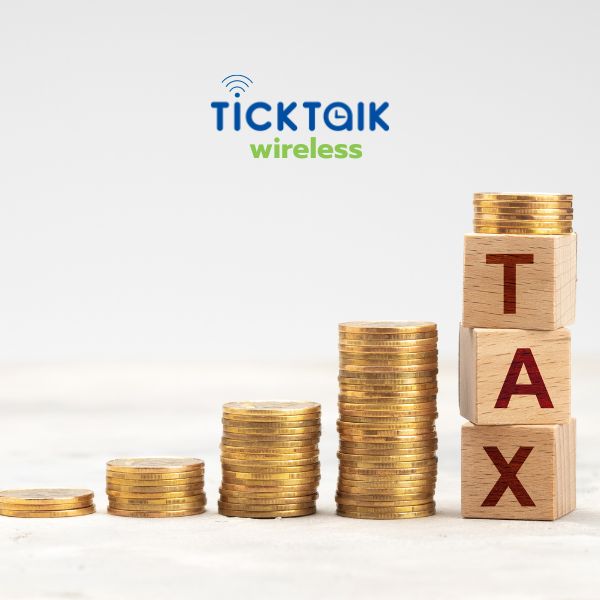As parents embrace the convenience and safety features of the TickTalk 5 Kids Smartwatch for their children, it's essential to understand the addition of telecom taxes and fees that accompany cellular service subscriptions.
With recent changes in tax regulations, effective from April 4, 2024, it's our goal to keep all families informed every step of the way.
In this article, we'll delve into the specifics of telecom taxes and fees, including the newly introduced Recovery Fee, and address how these changes affect TickTalk 5 users.
Understanding Telecom Taxes and Fees:
Telecom taxes and fees are not your typical sales tax or excise tax on telecom services; they are far more regulated and extensive. These taxes encompass a range of federal, state, and municipal taxes and fees that telecom companies are obligated to collect, file, and remit. From charges associated with the sight and hearing impaired to local number portability and the North American Numbering Plan, telecom taxes and fees cover a wide array of regulatory requirements.
Calculation of Taxes and Fees:
Taxes and fees are calculated based on the billing address of the subscriber. TickTalk Wireless partners with experts to analyze the anticipated usage of a plan and minimize tax costs while ensuring compliance. By considering factors such as usage patterns and regulatory requirements, TickTalk Wireless can accurately determine the taxes owed by each user based on their address.
Introduction of the Recovery Fee:
To cover expenses incurred in meeting telecom regulations, TickTalk Wireless has introduced the Recovery Fee. Unlike telecom taxes, the Recovery Fee is not a tax but rather an additional charge imposed to recover costs associated with administrative, legal, and other expenditures. The Recovery Fee will be collected in addition to telecom taxes, ensuring that TickTalk Wireless can cover these regulatory costs without impacting operational efficiency.
Impact on Users:
TickTalk Wireless will include telecom taxes, fees, and the Recovery Fee in your TickTalk Wireless bill. These extra charges will be on top of what you pay for your plan.
Good to Know
Here are some examples of states known for imposing relatively high taxes and fees on telecommunications services:
| Note these compliance fees are updated periodically. Please consult local jurisdictions for more information. |
-
New York:
- State Sales Tax on Telecommunications: New York charges a state sales tax on telecommunication services which, when combined with local taxes, can result in a high overall tax rate.
- Metropolitan Commuter Transportation District (MCTD) surcharge: This surcharge applies to certain services provided within the metropolitan commuter transportation district, including telecommunication services.
-
Florida:
- Communications Services Tax (CST): Florida has a high CST that applies to all telecommunications services, including cable, satellite, and VoIP services. This tax is in addition to the regular state sales tax.
-
Illinois:
- Telecommunications Excise Tax: Illinois imposes a state excise tax on telecommunications services.
- Chicago Telecommunications Tax: In addition to state taxes, Chicago imposes its own telecommunications tax, which is higher than many other locales.
-
Washington:
- State Business and Occupation (B&O) Tax: This tax is levied on the gross receipts of businesses operating in Washington, including telecommunications companies.
- State Sales Tax and Local Utility Taxes: Washington also imposes a sales tax and various local utility taxes on telecommunications services.
-
Nebraska:
- Telecommunications Occupation Tax: Nebraska has one of the highest occupation tax rates applied to the revenue of telecommunications businesses.
- Universal Service Fund: The state also levies a charge to support its Universal Service Fund, which is relatively high compared to other states.
-
California:
- State 911 surcharge applies to all lines unless they are otherwise tax exempt. You can read more information on this here. In the user's invoice, this is called "State E911 Fee".
- San Francisco local tax is typically referred to as "Access Line Tax". This applies to mobile telephone communications services for both non-residential and residential users. You can read more information on this here. In the user's invoice, this is called "Local E911 Fee".
Conclusion:
All connectivity service providers in the United States are required to collect and file regulatory fees and taxes on a federal, state and local level. Typically, these amount to between 10-20% of a monthly subscription. Our goal is to minimize tax costs while ensuring compliance, so parents can continue to enjoy the benefits of connectivity and safety for their children without undue financial burden.



Share:
What Is The Main Difference Between TickTalk 4 & TickTalk 5?
Tips for Balancing Online Learning and Eye-Friendly Screen Habits for Kids